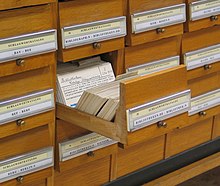index card
An index card is the summary of certain data according to a specified scheme on a card for an index . The term Fiche ([ fiʃ ], Swiss High German [ ˈfiʃə ] pronounced) is less common .

use
Originally, these were usually cards made of sturdy cardboard , on which the required data was entered, often in preprinted forms . These cards were then sorted according to certain criteria (for example alphabetically) and collected in card index boxes. This enabled quick access to this data. Any protruding sections of index cards are called tabs or tabs . Colored tabs attached at different positions enable a coded access system that is independent of the sorting. Hand punch cards enable more structured access similar to simple database systems.
Index cards in a conventional library catalog are called catalog sheets .
Today the term is also occasionally used for the data records in an electronic database , although they are no longer "maps". For example, the scope of old versions of the Windows operating system (up to Windows 3.11 ) includes a program that has the English name for card index box ( cardfile.exe ) and whose user interface is reminiscent of index cards.
Related topics
- A flash card and flash card software support the acquisition of knowledge.
- Register sheets or cards are called the separators in files.
- Hand punch cards such as edge punch cards , slot punch cards and viewing punch cards enable search operations in card files by means of coding.
- Microfiche also microfiche called.
- In list boxes typically purpose-designed index cards are used.